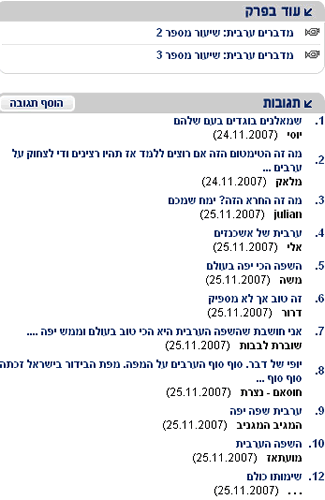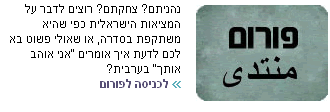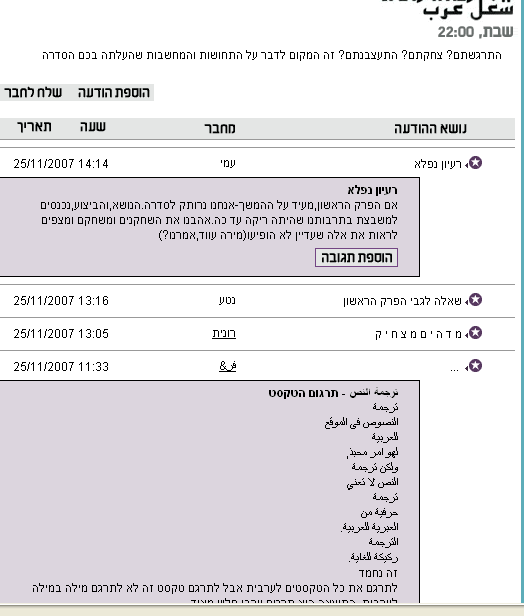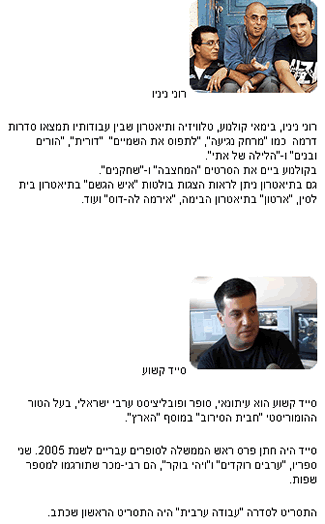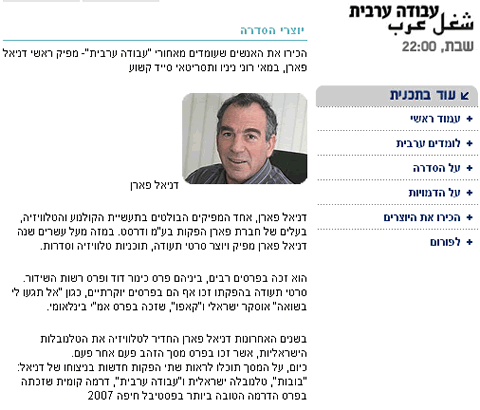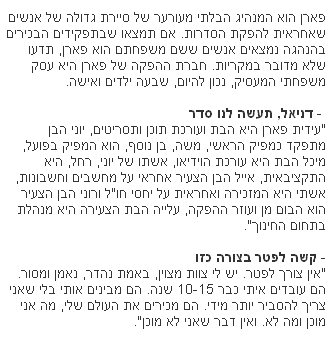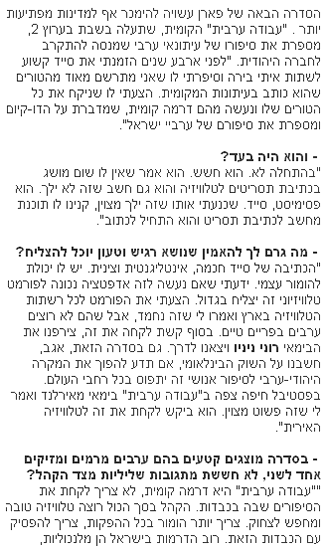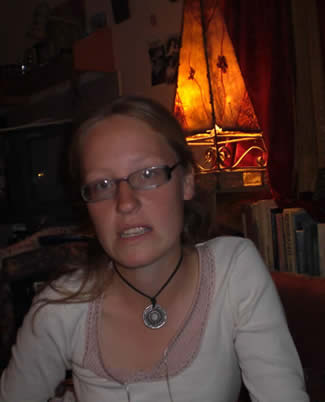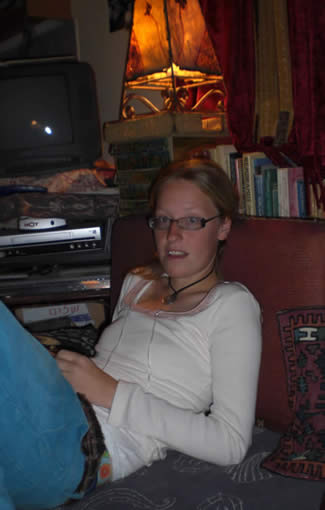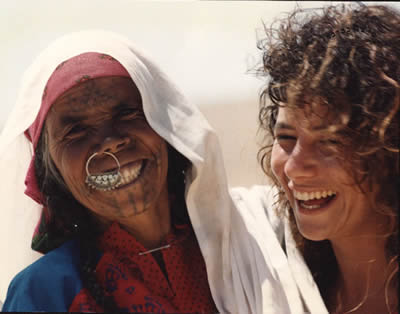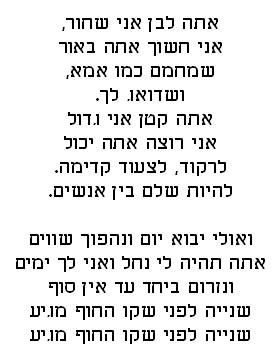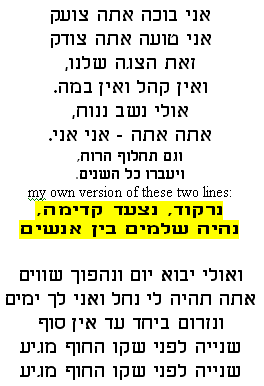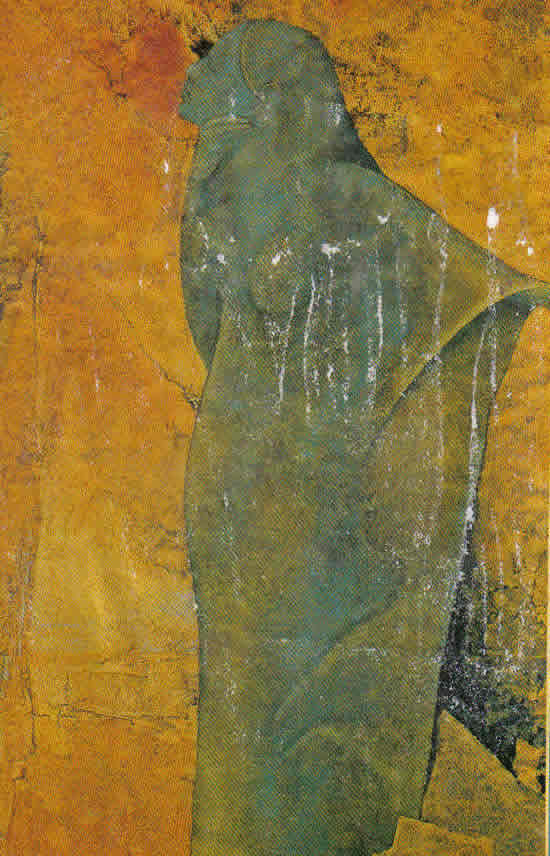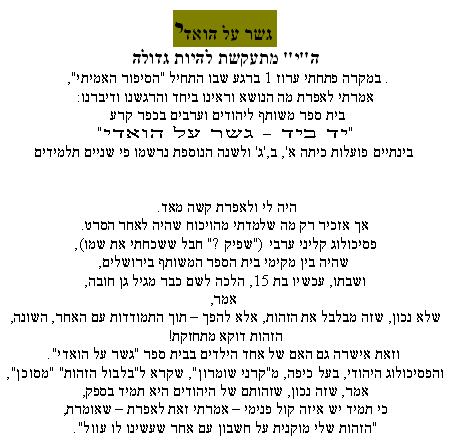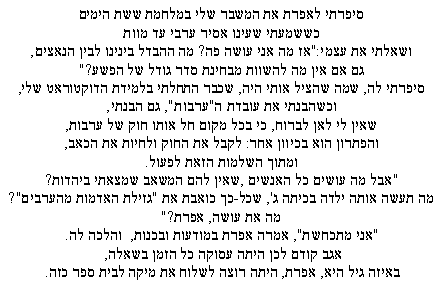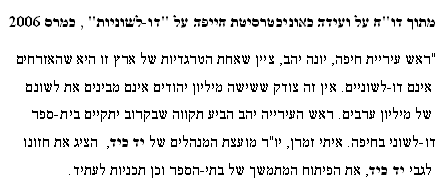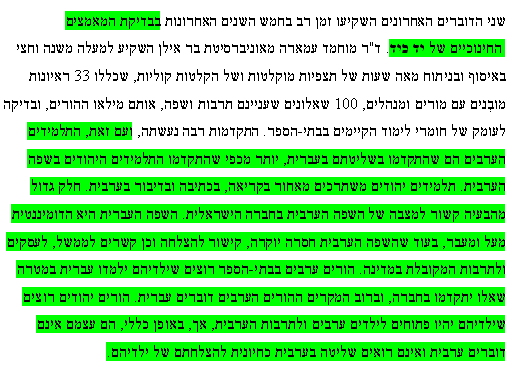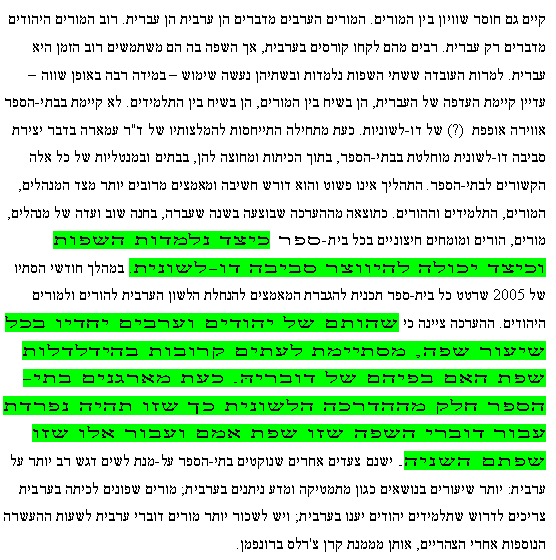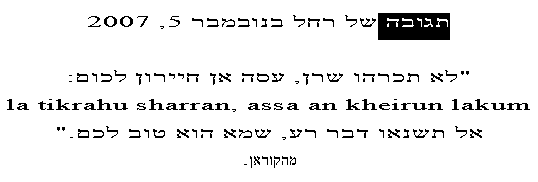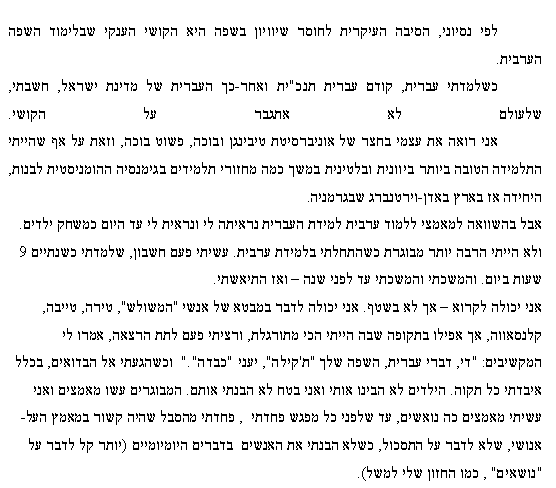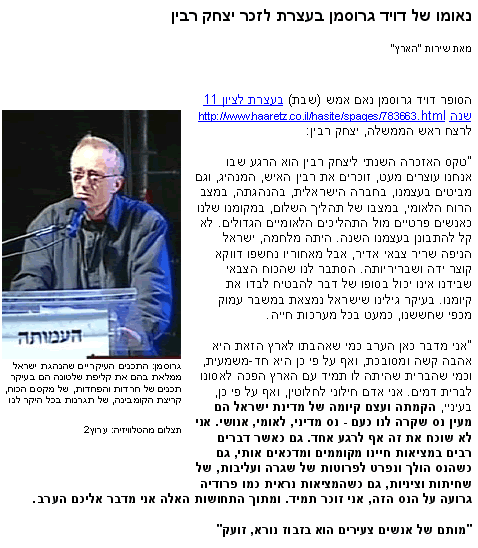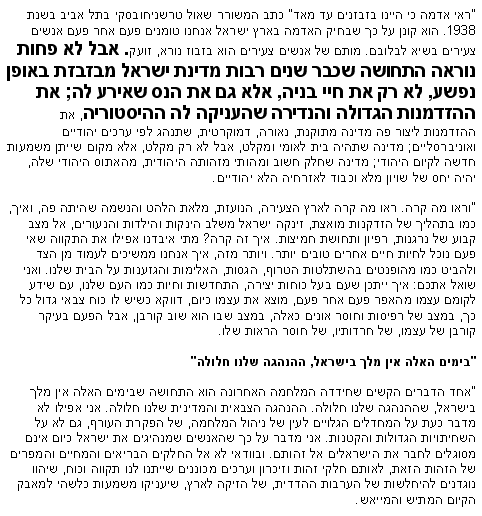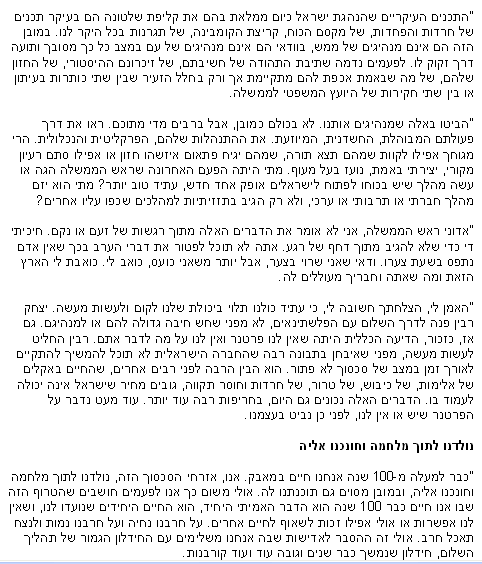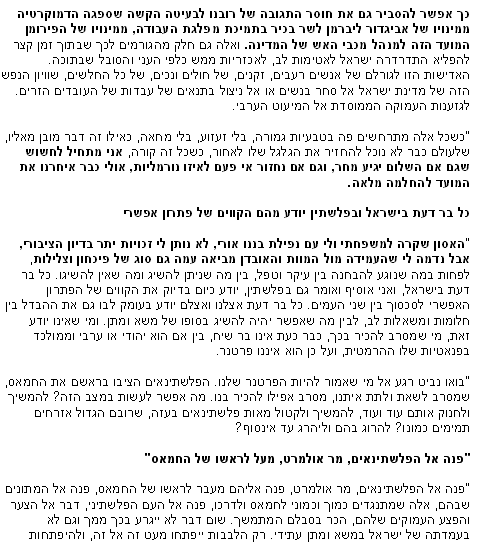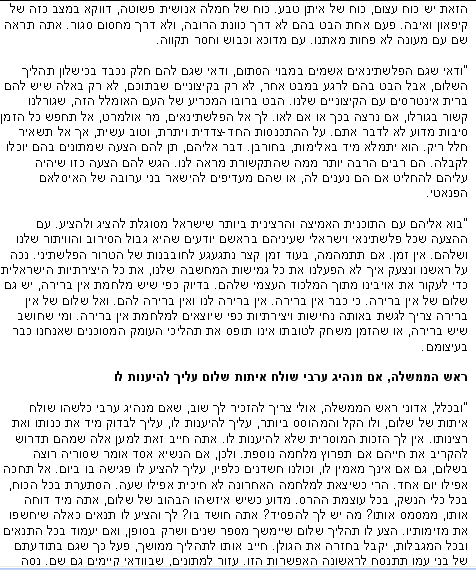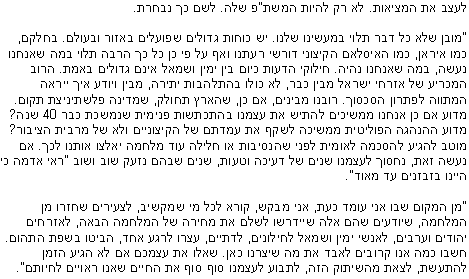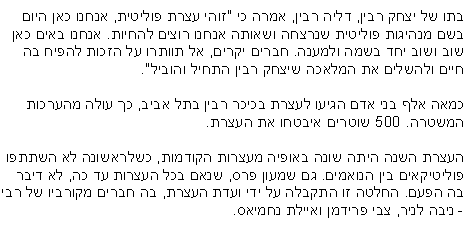|
Back to Overview of all sculptures in the fourfold library of "InteGRATion
into GRATeFULLness"
![]()
InteGRATion into GRATeFULLness
Fine-tuning to my Presence
2007_11_25-26; latest update: 2007_12_08
On the
Eve of Annapolis
Listen
to the song about "one day becoming equal - perhaps"
I woke up with the urge to gather together,
what occurred to me during this month concerning the aching problem of
Israel&Ismael.
(I keep using this code, though Nimr
Ismair, Ph.D., my partner in "Partnership" till Dec.1980,
in 2003, when I visited him before starting "Noah's Ark",
protested vehemently against using "Ismael" [who like Isaac was
Abraham's son] as a metaphor,
claiming that it did not include his identity as a Maronite Christian Arab.)
Though I avoid listening to the news on Israeli channels,
I happened to zap into a reportage about "Annapolis",
and later watched the first chapter of a
comical series: "Arab Work"
about the identity-crisis of an Israeli Arab journalist,
whose job it is to represent the "Arab Sector" in the Israeli media.
I wasn't amused,
but the very fact, that such a series, written by an Arab author, is possible,
is encouraging.
|
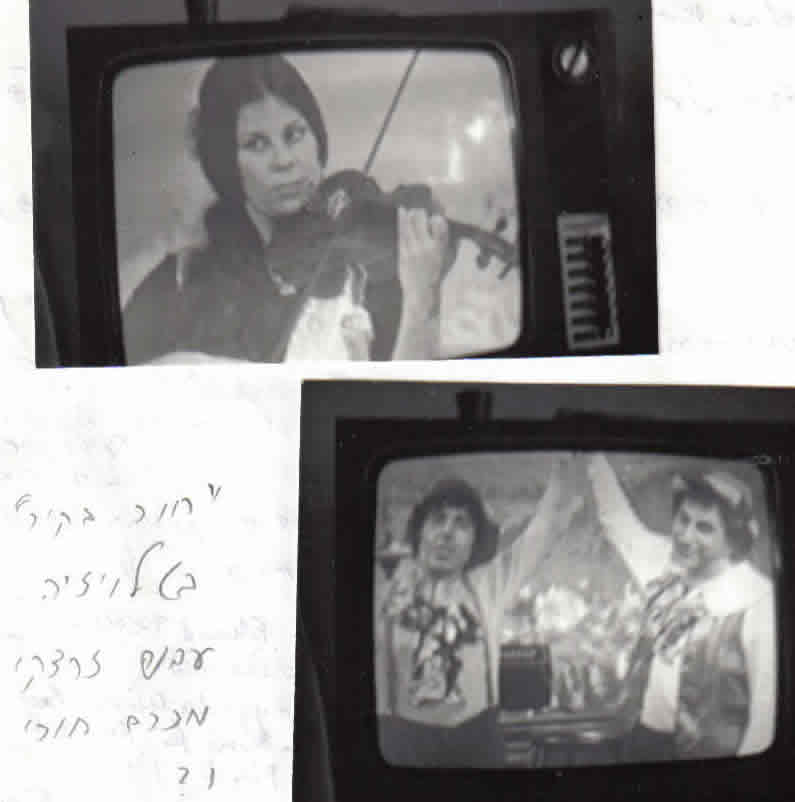 Febr.
2, 1979
Febr.
2, 1979

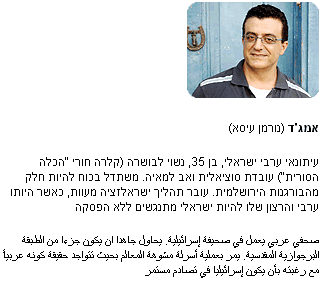 |
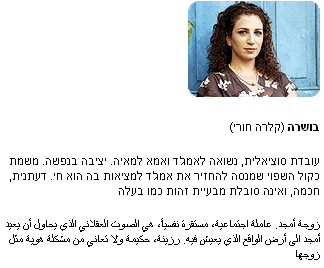 |
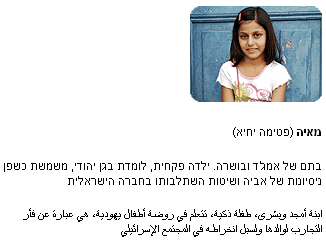 |
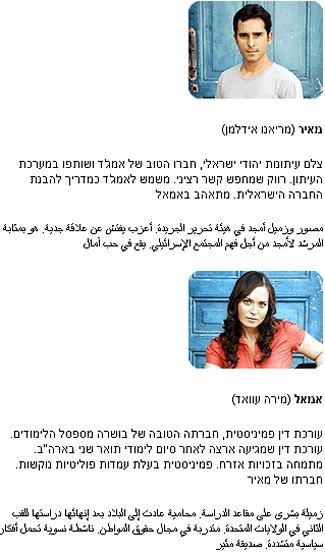 |
That the series includes some simple lessons
|
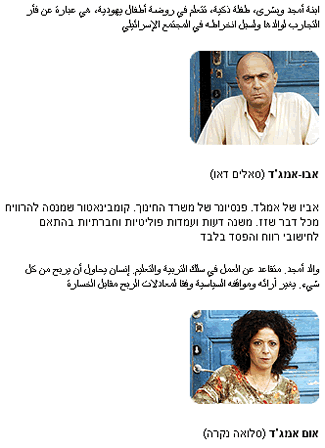 |
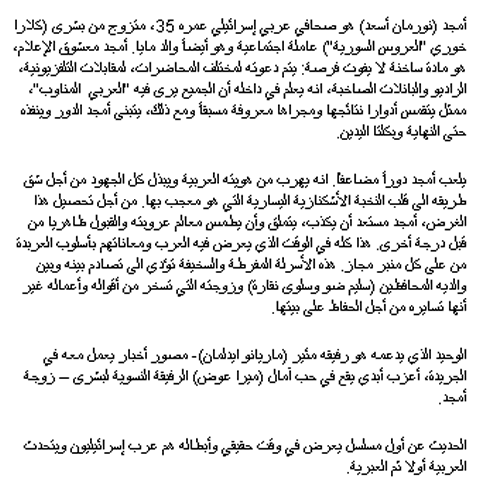 |
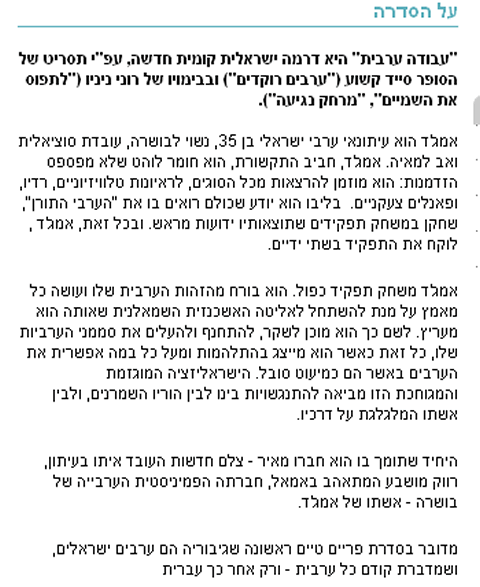 |
|
|
About director Ronni Ninio and script-writer
Sayed Kashua
|
A
Test "It's not easy for Israeli Arabs to digest an Arab anti-hero, who assimilates to Ashkenazi Jews" 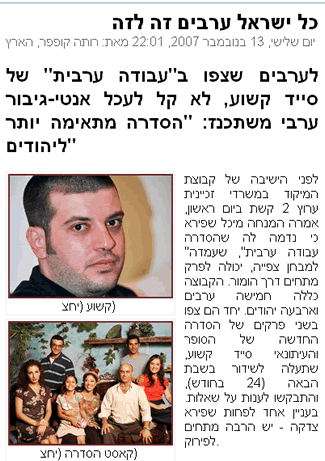
|
In Hebrew about Kashua's book :"And it was morning"
In English: From the diary of Karen Alkaly-Gut, December 14, 2004 Sayid Kashua won the President's Prize for literature. His picture in the paper is now on my kitchen table ...I am thrilled - because I know he is too young to have won on his achievements, but because he addresses the issue of the problematics of Arab-Israeli identity. And this means that we too are beginning to see the other as part of us. ... its a good beginning and he's a great writer. Why have I never won anything? One of the judges
for this prize asked me ... why do all the prizes exclude English writing.
Please believe me, i have no problem with that, as long as Sa'id Kashua
can win. |
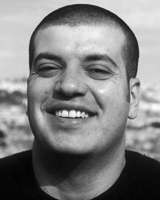 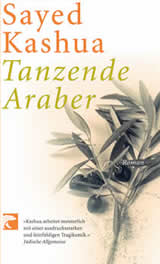
|
Dancing
Arabs in the Arab-Hebrew Theatre of Jaffa Co-produced with the Haifa Theater Adapted and Directed by Adi Segev based on a book by Sayid Kashua Ali Masalkha,
|
|
On the Internet I found info about Sayed Kashua mainly German Sayed
Kashua 2006 Kashua received the price of the Lessing-Akademie
|
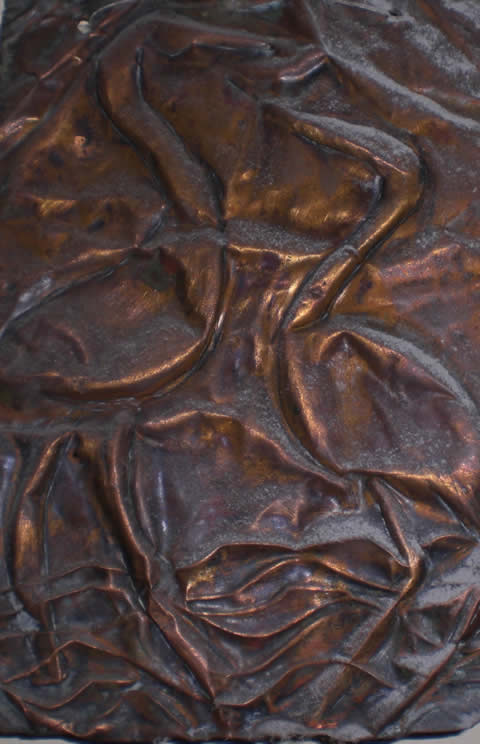 |
|
Here are excerpts from an
interview with him
|
Yesterday
night on channel 2 as well: Not less encouraging than the "Arab Work" series may be the documentary series that followed it: "The seven lost years", about the history between Israel and the Palestinians in the last seven years, though I closed it after a few minutes - I just don't have the strength to go through all this again. |
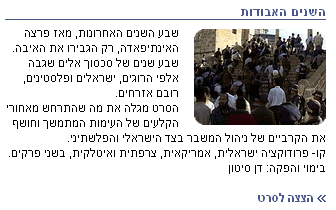 |
And there was another info and experience which
pleased me:
|
Some days ago, in the European 3SAT channel, there was a reportage about "The Arab Institute for Research on the Jewish Holocaust", which was fascinating and extremely encouraging. A Christian Arab lawyer from Nazareth teaches Arab pupils and grownups, that without recognizing each others pains there cannot be peace. And he had the courage to use a metaphor: "If I may compare the Palestinian suffering to a tree, then I must compare the Jewish suffering to a forest." I cried and I'm crying again while reporting this here. In the pool this morning and on my way to and fro I was singing Bialik's song "The Bird", and asking myself, why it took me 43 years to learn the lyrics of this poem, which must be one of the best ever written on this planet. Though created between 1890 and 1892, it holds within it that forest, but contrasted by the beauty of nature in that "warm, beautiful land", the Hermon and the Jordan, and by the enchanting voice of a wandering bird that came back from there to his northern exile. The name of this Holocaust researcher in Nazareth is Khaled Khateb Mehamed. |
Muslim
opens first Arab Holocaust museum in Nazareth Khaled's
Holocaust institute If the Palestinians were made aware of the horrors that took place during the Holocaust, the conflict would end within a few days, he says.
|
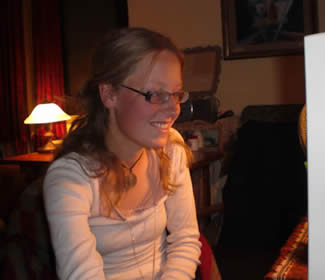 Dina sits down at my computer and searches for the lyrics of a song "which expresses, what we young people in the army all feel". Eviatar Banai:Genesis 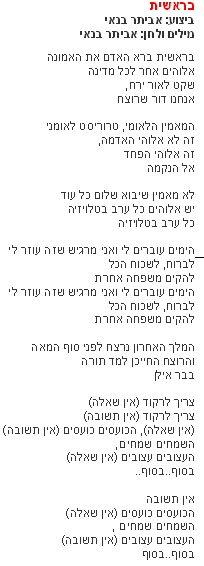
|
20:37 [completed the next morning]
Some 6 weeks ago she woke up, "Why then are you so beautiful today? |
|
.... |
And now the copy of my diary on November 4,
partly in Hebrew about a documentary, "Bridge above the Wadi" ,
about an Arab-Jewish school, the first in an Arab village, Kfar Kara,
and then in English - my "via dolorosa" with the Arab language.
|
From my diary, November 4th, 2007 [About "Bridge above
the Wadi" and the accusation,
It is not true, that Jews in Israel don't want
to make the effort to learn Arabic. But whenever someone tells me
with pride: "I've started to learn
Arabic", I must fake enthusiasm,
and my heart aches with pain and frustration. It is mustaheel
– impossible – to
learn Arabic! Except for the correspondent for Arab affairs –
Oded Granot– I've never heard somebody who learnt Arabic as
a second language, really master it. I've learnt both, Hebrew and Arabic, first
the Hebrew of the Bible, than spoken Hebrew. I see myself in the court
of Tuebingen University before a Hebrew lesson. I cry: 'I shall never
learn this language!'
I thought the man was maybe an Iraqi Jew. But while we talked – in Hebrew , of course – he said that he was an Arab, yes a teacher in Arabic, in his home village Kalansawa. I asked him, if he could teach me spoken Arabic and proposed a technical way to do that: I would write down simple sentences about daily matters, and send these to him together with a tape. He then would translate my sentences and speak them on the tape and send this back to me, and I , then, would listen to these tapes over and over again, until I would get the language into my intestines! Or so I thought...
A very good study book for spoken Arabic was
published by Prof.
Moshe Piamenta. If my hope for conquering Arabic was raised, it
was because of this book, and also this outstanding man, whom I visited
once, much later, in order to thank him. Each lesson ended with a
proverb, and some of them helped me to live my life, a life characterized
by endless frustration concerning the fulfilling of my "vocation"...
When I had finished my Ph.D. thesis, (5 hours
per day on the average between 1967 and 1972) and another book within
the edition about Franz Rosenzweig's work, and my youngest son had
started school, I had an idea. Though I was now dedicating all my
free time to preparing for what I thought was my vocation, I felt,
I needed to do more for "Peace", and the least I could do,
was to improve my Arabic.
So I was hosted for 3 days at Beit-Safafa, a village near Jerusalem, then divided between Israel and Jordan. Relatives could talk to each other only through the fence. The 3 days were uncredibly difficult for me, not only because then it was , as one says today, "a cultural shock " for me , for instance to eat on the floor (and i came back with Amoebae, which will stay in my intestines forever, and attack me every once and then) , but because of the frustration of communication. One of the sons of the family knew Hebrew well. But I didn't know Hebrew well. The only togetherness which I enjoyed, was, when they took me to another family, where we danced.When dancing, one is free from needing to talk.. When in January 1965 the daughter Buseima, now grown-up and about to marry somebody in Kuweit, came to see me (together with a male relative, of course), while I was sick in bed after having given birth to my daughter, we talked Hebrew... She brought me a gift, which i still cherish: two cranes engraved in copper.
To tell just one story: one winter morning,
probably in early 1991, I was alone, without co-workers, without guests:
I saw Juma'a approaching the Succah and went out to meet him:
"Rachel, can you come with your jeep to
my compound and help me get my tractor started? The battery has run
out and the water too, I need water for my animals".
In October 2007 Yahia came to my home in Arad.
"Had'ra is sure you are dead!"
he said seriously and asked me to come with
him to his
family in the Zealots' Valley.... I don't know, why this time I even couldn't understand Had'ra anymore. Maybe , because young people in all languages "try" to speak in a way, that "ordinary" people have a hard time grasping, be it English, German, Hebrew or Arabic . In any case, - together with other frustrations – I finally decided to give up. I already gave away half of my books, and the other half, about 15, I'll only keep, because they fit well in my present shelf. And I'm not making any more effort to learn Arabic, as I've done from 1965 till 2005 – forty years. (In fact , I wanted to start learning it already before immigrating to Israel in 1964. At Tuebingen University I was appointed a student teacher from Egypt. But when after the first lesson he asked me about the purpose of wanting to learn Arabic, and heard, that I was going to immigrate to Israel, the lessons stopped. The Union of Arab students" forbode him to teach me: "She may want to learn it to become a spy."
I have not studied the origin of the semitic languages, but the richness of the Arabic grammar and vocabulary has always enticed me, and when I was still hopeful, that in time – with constant practicing and training – I would master the language ( I even acquired an Arabic type-writer and learnt the method of writing "blindly" with ten fingers) – I used to say: "If my time will be ripe for becoming a writer, I want to write in Arabic." I repeat:
You are white, I am black And perhaps a day will come and we'll
become equal,
|
Hagar talks with the Angel -
a painting by an Indian painter from
a Christian calendar
http://en.wikipedia.org/wiki/Hand_in_Hand_%E2%80%93_Bridge_over_the_Wadi
I want to say all this also
in English (see left frame) Continuation of my diary
on November 4, 2007
Dalia Rabin, Yitzchak Rabins' daughter, said at the mass gathering: Nov. 28, 2006 - Diary Entry:
|
There are so many people in Israel yearning for an "Annapolis" to
bear fruit.
May this small piece of info, of November a year ago, represent them all:
|
To All Nations Cafe Let me thank you for the small, May you love yourselves and cause others to love
themselves,
Nov. 12 Dear Christa-Rachel, |
All Nations Cafe Newsletter
Autumn 2006 Dear Friends, We would like to share some exciting news from the past months since we had our Middle East Families Camp, and to invite you to our autumn gatherings. Teheran and Jerusalem Connecting in Berlin, Germany In October we had a Middle East gathering in Berlin, hosted by the Koenigin Luise International School. The two evenings brought together people from Germany, England, Palestine, Dubai, Iraq, Israel and Iran. Some of the participants came from Karame, an Arab youth center in Berlin, which promotes dialog between Israelis and Palestinians. With the help of our hosts, Manfred and Gisela, who recently returned from Teheran, where they have a cultural exchange project with a local school, we created a Persian cafe atmosphere, complete with original plates, trays, cups, pastries, nuts, drinks and smoking pipe. The first evening we had an introduction to the All Nations Cafe project and the vision behind it. The participants visualized the site on the border of Israel and Palestine and its future potentials, and blessed it. We concluded the discussion with a Circasian dance, and then moved to the fire place room to watch videos from the Families Camp, exchange thoughts and enjoy Persian delights. On the second evening we had a deeply moving Family Constellation workshop (led by Yesha) focused on the relationships between Germans, Israelis and Palestinians; a Theater workshop (led by Dhyan) presenting our individual identities through the different birth places or origins of our ancestors; and a Dance of Universal Peace workshop (led by Martin) which concluded the event with a joyous circle. Gatherings of Great Love at Ein-Haniya, Israel/Palestine The All Nations Cafe team, together with friends from the West Bank, Israel and the international community, have been coming together at the same site where we held the Middle East Families Camp. These gatherings are all about sharing getting to know each other on a personal level, creating family-like bonds between us and nourishing these bonds. Usually, we share food and drinks, play live music, sing together and dance round the camp fire into the night. From November, we are having the Gatherings of Great Love every Tuesday, at Ein-Haniya, on the road between Jerusalem and Bethlehem. Apart from working on the land, cleaning, restoring, and keeping the nature beautiful, we will have workshops on different subjects such as: Esperanto language, Circasian dancing, Permaculture, etc. The gatherings are an open space for your ideas and creativity. |
I watched the "performance" of Abbas and Olmert and made photos of the screen - to give energy to their intentions&promises
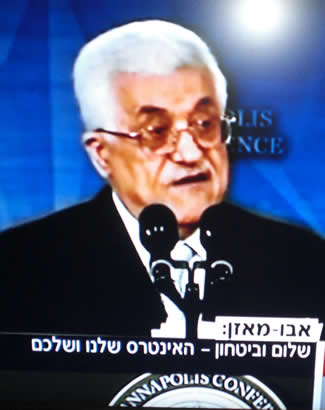 |
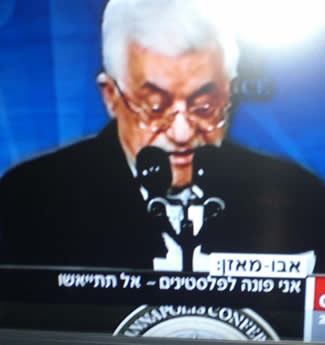 |
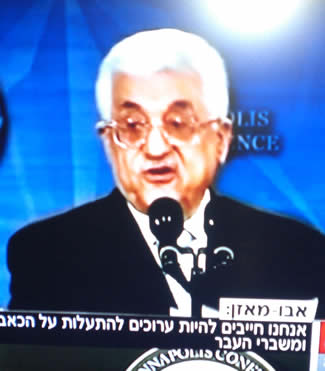 |
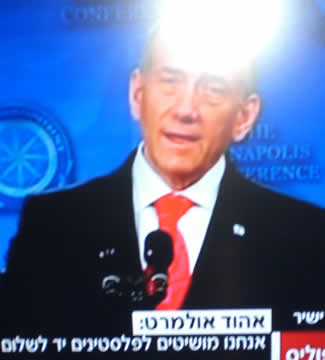 |
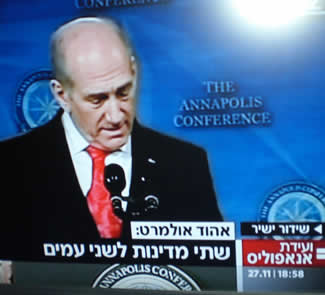 |
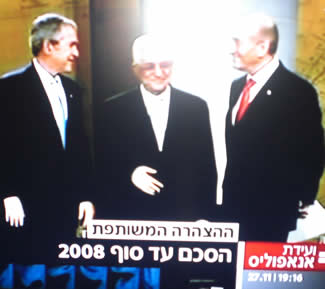 |
| How Annapolis Helps By David Ignatius, Washington Post [emphasis by me, Rachel] Wednesday, November 28, 2007; Page A23 After watching President Bush earnestly deliver his benediction to the Annapolis peace conference, …. But in this case, I take the contrarian view:
Something real did happen in Annapolis. The process
that began Tuesday may not lead to peace, but that doesn't mean that
Annapolis was simply a gaudy, empty show. A careful reading of the "Joint
Understanding" that was announced by Bush reveals the achievements
and the failures. I find several important steps forward: |
Dear David Ignatius ---November 28, 2007 I've stopped watching the news on Israeli channels. Now I opened "Annapolis" via Google and found
your article.
If you have a free moment, just glance over the library,
|
to
former sculpture of my Present  to
next sculpture of my Present
to
next sculpture of my Present

